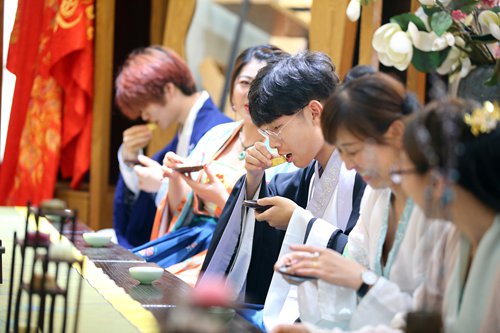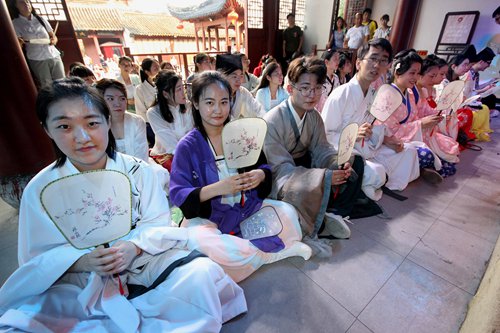METRO SHANGHAI / METRO SHANGHAI
Traditional clothing is entering a trend for younger Chinese
Heart full of hanfu
As the "hanfu (traditional Han Chinese clothing) fever" has spread widely in China during recent years, people are not surprised to see young ladies wearing hanfu on the street. During holidays, like the National Day holiday, young girls brighten up the streets with their hanfu clothing.
The name hanfu is referred to as pre-17th century traditional clothing of the Han people. Besides young ladies, more young men are falling in love with this traditional clothing and its historical roots.
The traditional clothing market has become another popular growth point in the field of men's fashion consumption, according to media reports.
From January to July this year, the proportion of men who purchased hanfu clothing on Fanli.com, an e-commerce platform, has reached 39.7 percent, up 196.2 percent year-on-year. Chengdu, capital of Southwest China's Sichuan Province, is home to the largest male consumer market of hanfu clothing.

Born with a love for beauty
Mohan, 28, who works in the hotel industry in Shanghai, has been a hanfu lover since 2015. "During that time, few people wore hanfu on the streets. I would explain to people who were curious about the reasons why I wore the traditional clothing on the streets," he recalls happily.
Mohan told the Global Times that he enjoyed talking with people about hanfu and sharing his stories with his friends.
The most expensive hanfu clothing he has worn is around 1,000 yuan ($139.64). He admits that he hasn't spent much on the traditional clothing because the style of men's hanfu clothing is too simple and the choices are limited. "I even feel jealous of girls who have a larger variety of choices of hanfu clothing," he said.
He complains that there isn't enough hanfu clothing designed for summer. "I don't think it has become a new men's fashion, but perhaps for girls. There are few styles and choices. How can it be fashionable?" he complained.
"I would like to buy expensive and fashionable hanfu," Mohan said, but he hopes more clothing could be designed for male consumers with fashion and style.
Another hanfu lover surnamed Xu echoed Mohan's view. Xu also became a hanfu lover in 2017 as he thought it's beautiful. "I don't feel embarrassed to wear the traditional clothing," Xu told the Global Times.
Xu, 33, a programmer working in Shanghai, likes to wear hanfu when he goes back to his hometown in Central China's Hunan Province, especially during the holidays like the Chinese New Year. "I wear shirts and pants at work, which is too common. I like the traditional clothing, which can be a surprise for people," Xu said.
Historical roots
"Her clothes are like the clouds and her face is like the flowers. Spring breeze blows the rail and the dew makes the flowers beautiful," reads the poem Qing Ping Melody. Famous Chinese poet Li Bai from the Tang Dynasty (618-907) wrote the poem, which describes Yang Yuhuan's beautiful looks and clothing. She was the favorite concubine of the Tang emperor Li Longji.
It's easy to think of the famous poem when people see hanfu for the first time. When the Global Times talked to several interviewees about what they think about the traditional clothing, most of them said "beautiful."
"It's not weird to see men wearing hanfu on the street. Even in the second- or third-tier cities in China, for example, I have seen hanfu lovers on the streets of Suzhou and Chengdu when I visited," Xiao Xi, 38, a hanfu lover and white-collar worker living in Hefei, capital of East China's Anhui Province, told the Global Times.
Xiao Xi takes part in the Hanfu Cultural Festival every year, which is one of China's largest hanfu-themed events in Xitang ancient town, East China's Zhejiang Province. Xiao Xi recalled, "Everyone wears hanfu in the festival. The feeling is very interesting. You can say hello to everyone even if they are strangers. People get to travel back to ancient times to experience historical culture."
Both Mohan and Xu agreed that the popularity of hanfu could help promote traditional Chinese culture. "More media reports and hanfu events help more people understand Chinese traditional culture," Xu said.
"The cultural recognition is also very important for young people to better understand their home country," Mohan echoed.
Niche market
The top 15 hanfu stores on Taobao, a Chinese e-commerce platform, saw 126 million yuan in transactions in June this year, up 15.67 percent from the previous month, according to Hanfu Information. Hanfu was the third most searched keyword among female consumers, while it is among the top 10 keywords searched by male consumers this year, according to the 2019 China Fashion Trend Report, released by Taobao in March.
The Global Times also spoke with a few hanfu online stores and most of them said that the number of male consumers is increasing compared with the previous years, but they refused to release an exact number due to business reasons.
However, due to a handful of hanfu lovers, the market is still very small, but expects huge potential. "I hope more hanfu clothing could be designed for male consumers with a good performance to price ratio," Mohan said.
The name hanfu is referred to as pre-17th century traditional clothing of the Han people. Besides young ladies, more young men are falling in love with this traditional clothing and its historical roots.
The traditional clothing market has become another popular growth point in the field of men's fashion consumption, according to media reports.
From January to July this year, the proportion of men who purchased hanfu clothing on Fanli.com, an e-commerce platform, has reached 39.7 percent, up 196.2 percent year-on-year. Chengdu, capital of Southwest China's Sichuan Province, is home to the largest male consumer market of hanfu clothing.

Hanfu lovers eat rice cakes at an event in Nantong, East China's Jiangsu Province. Photo: VCG
Born with a love for beauty
Mohan, 28, who works in the hotel industry in Shanghai, has been a hanfu lover since 2015. "During that time, few people wore hanfu on the streets. I would explain to people who were curious about the reasons why I wore the traditional clothing on the streets," he recalls happily.
Mohan told the Global Times that he enjoyed talking with people about hanfu and sharing his stories with his friends.
The most expensive hanfu clothing he has worn is around 1,000 yuan ($139.64). He admits that he hasn't spent much on the traditional clothing because the style of men's hanfu clothing is too simple and the choices are limited. "I even feel jealous of girls who have a larger variety of choices of hanfu clothing," he said.
He complains that there isn't enough hanfu clothing designed for summer. "I don't think it has become a new men's fashion, but perhaps for girls. There are few styles and choices. How can it be fashionable?" he complained.
"I would like to buy expensive and fashionable hanfu," Mohan said, but he hopes more clothing could be designed for male consumers with fashion and style.
Another hanfu lover surnamed Xu echoed Mohan's view. Xu also became a hanfu lover in 2017 as he thought it's beautiful. "I don't feel embarrassed to wear the traditional clothing," Xu told the Global Times.
Xu, 33, a programmer working in Shanghai, likes to wear hanfu when he goes back to his hometown in Central China's Hunan Province, especially during the holidays like the Chinese New Year. "I wear shirts and pants at work, which is too common. I like the traditional clothing, which can be a surprise for people," Xu said.
Historical roots
"Her clothes are like the clouds and her face is like the flowers. Spring breeze blows the rail and the dew makes the flowers beautiful," reads the poem Qing Ping Melody. Famous Chinese poet Li Bai from the Tang Dynasty (618-907) wrote the poem, which describes Yang Yuhuan's beautiful looks and clothing. She was the favorite concubine of the Tang emperor Li Longji.
It's easy to think of the famous poem when people see hanfu for the first time. When the Global Times talked to several interviewees about what they think about the traditional clothing, most of them said "beautiful."
"It's not weird to see men wearing hanfu on the street. Even in the second- or third-tier cities in China, for example, I have seen hanfu lovers on the streets of Suzhou and Chengdu when I visited," Xiao Xi, 38, a hanfu lover and white-collar worker living in Hefei, capital of East China's Anhui Province, told the Global Times.
Xiao Xi takes part in the Hanfu Cultural Festival every year, which is one of China's largest hanfu-themed events in Xitang ancient town, East China's Zhejiang Province. Xiao Xi recalled, "Everyone wears hanfu in the festival. The feeling is very interesting. You can say hello to everyone even if they are strangers. People get to travel back to ancient times to experience historical culture."
Both Mohan and Xu agreed that the popularity of hanfu could help promote traditional Chinese culture. "More media reports and hanfu events help more people understand Chinese traditional culture," Xu said.
"The cultural recognition is also very important for young people to better understand their home country," Mohan echoed.
Niche market
The top 15 hanfu stores on Taobao, a Chinese e-commerce platform, saw 126 million yuan in transactions in June this year, up 15.67 percent from the previous month, according to Hanfu Information. Hanfu was the third most searched keyword among female consumers, while it is among the top 10 keywords searched by male consumers this year, according to the 2019 China Fashion Trend Report, released by Taobao in March.
The Global Times also spoke with a few hanfu online stores and most of them said that the number of male consumers is increasing compared with the previous years, but they refused to release an exact number due to business reasons.
However, due to a handful of hanfu lovers, the market is still very small, but expects huge potential. "I hope more hanfu clothing could be designed for male consumers with a good performance to price ratio," Mohan said.

Hanfu lovers participate in a hanfu event in Nanjing, capital of Jiangsu. Photo: VCG
